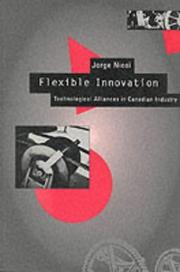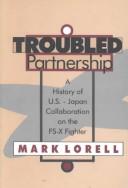| Listing 1 - 10 of 17 | << page >> |
Sort by
|
Book
ISBN: 3658026065 Year: 2013 Publisher: Wiesbaden : Springer Gabler,
Abstract | Keywords | Export | Availability | Bookmark
 Loading...
Loading...Choose an application
- Reference Manager
- EndNote
- RefWorks (Direct export to RefWorks)
F & E-Projekte sind mit hohen Kosten und Risiken verbunden und werden daher von Unternehmen häufig in Kooperationen durchgeführt. Hierbei stellt Vertrauen einen zentralen Faktor für den zukünftigen Erfolg bzw. die zukünftige Performance dar. Vor diesem Hintergrund analysiert Benedikt Niemann zunächst den vermuteten Zusammenhang zwischen Vertrauen und Kooperationsperformance mittels ausgewählter empirischer Untersuchungen und stellt eine Bestätigung – wenn auch unter Einschränkungen – fest. Für ein Unternehmen, das an einer F&E-Kooperation beteiligt ist, stellen sich die Fragen, ob der Zusammenhang zwischen Vertrauen und Kooperationsperformance auch für die eigene interorganisationale Zusammenarbeit Gültigkeit besitzt und wie stark dieser ausgeprägt ist. Der Autor erstellt ein normatives, kooperationsspezifisches Vorgehensmodell, in dem unterschiedliche Methoden zur Messung von Vertrauen und Kooperationsperformance sowie des Zusammenhangs zwischen diesen beiden Größen analysiert und zweckbezogen weiterentwickelt werden. Der Inhalt · Grundlagen zu F & E: Kooperationen, Vertrauen und Performance · Zusammenhang zwischen Vertrauen und Kooperationsperformance · Vertrauens-Performance-Messmodell für F & E-Kooperationen Die Zielgruppen · Dozenten und Studenten der Betriebswirtschaftslehre mit den Schwerpunkten Projekt- und Kooperationsmanagement sowie F & E-Management · Fach- und Führungskräfte aus Unternehmen, die interorganisationale Kooperationen realisiert haben oder anstreben Der Autor Benedikt Niemann promovierte bei Prof. Dr. Wolfgang Ossadnik am Lehrstuhl Rechnungswesen und Controlling der Universität Osnabrück.
Book
ISBN: 9282558932 9789282558935 Year: 1986 Volume: vol *423 Publisher: Luxembourg: Office des publications officielles des Communautés européennes,
Abstract | Keywords | Export | Availability | Bookmark
 Loading...
Loading...Choose an application
- Reference Manager
- EndNote
- RefWorks (Direct export to RefWorks)
Book
Year: 2008 Publisher: [Washington, D.C.?] : United States Dept. of Agriculture, Agricultural Research Service, Office of Technology Transfer,
Abstract | Keywords | Export | Availability | Bookmark
 Loading...
Loading...Choose an application
- Reference Manager
- EndNote
- RefWorks (Direct export to RefWorks)
Agriculture --- Cooperative industrial research --- Technology transfer --- United States.
Book
Year: 1995 Publisher: Santa Monica, CA : RAND Corporation,
Abstract | Keywords | Export | Availability | Bookmark
 Loading...
Loading...Choose an application
- Reference Manager
- EndNote
- RefWorks (Direct export to RefWorks)
The United States has generally tried to discourage its allies from developing their own major weapons systems, to promote equipment standardization with U.S. forces, and tie allied security policies more firmly to U.S. interests. Japan's FS-X fighter is perhaps the most prominent example of this policy. Japan had originally intended to design and build an indigenous fighter; the Pentagon urged Japan to buy an existing U.S. fighter. After difficult negotiations, the two sides eventually agreed to lightly modify the U.S. F-16 jointly to meet Japan's special needs. But as a result of political controversies over technology transfer and trade, the U.S. side focused increasingly on the economic aspects of the program. Under cover of these controversies, the Japanese have been able to move the FS-X design and technology applications ever farther away from the F-16 toward a much more nearly indigenous creation. In the end, the FS-X program has failed to meet many of the original U.S. expectations, and Japan has reaped an unexpected reward--experience in developing a world-class fighter aircraft. This book presents a history of the program, while a companion volume, MR-612/1-AF, summarizes and assesses the program.
Technology transfer --- Technology transfer --- FSX (Jet fighter plane) --- Aircraft industry --- Aircraft industry --- Cooperative industrial research --- Cooperative industrial research --- Government policy --- Government policy

ISBN: 1282853538 9786612853531 0773565566 9780773565562 9781282853539 0773513353 9780773513358 0773513345 9780773513341 6612853530 Year: 1995 Publisher: Montreal, Que. McGill-Queen's University Press
Abstract | Keywords | Export | Availability | Bookmark
 Loading...
Loading...Choose an application
- Reference Manager
- EndNote
- RefWorks (Direct export to RefWorks)
Basing his study on in-depth interviews with more than 130 companies across Canada, Jorge Niosi analyses the scope of collaborative research activities - both domestic and international - in the fields of biotechnology, electronics, advanced materials, and manufacturing of transportation equipment. He describes successful patterns of collaboration, obstacles and limitations, and the role of public policy, universities, and government laboratories in technological alliances. He compares Canadian partnerships and public policy with similar patterns in the United States, Europe, and Japan.
Cooperative industrial research --- Research, Industrial --- High technology industries --- Industries --- E-books
Book
ISBN: 3870810815 Year: 1992 Publisher: Paris : Economica,
Abstract | Keywords | Export | Availability | Bookmark
 Loading...
Loading...Choose an application
- Reference Manager
- EndNote
- RefWorks (Direct export to RefWorks)
Cooperative industrial research --- Producer cooperatives --- Restraint of trade --- Law and legislation --- Law and legislation
Book
Year: 1995 Publisher: Santa Monica, CA : RAND Corporation,
Abstract | Keywords | Export | Availability | Bookmark
 Loading...
Loading...Choose an application
- Reference Manager
- EndNote
- RefWorks (Direct export to RefWorks)
The United States has generally tried to discourage its allies from developing their own major weapons systems, to promote equipment standardization with U.S. forces, and tie allied security policies more firmly to U.S. interests. Japan's FS-X fighter is perhaps the most prominent example of this policy. Japan had originally intended to design and build an indigenous fighter; the Pentagon urged Japan to buy an existing U.S. fighter. After difficult negotiations, the two sides eventually agreed to lightly modify the U.S. F-16 jointly to meet Japan's special needs. But as a result of political controversies over technology transfer and trade, the U.S. side focused increasingly on the economic aspects of the program. Under cover of these controversies, the Japanese have been able to move the FS-X design and technology applications ever farther away from the F-16 toward a much more nearly indigenous creation. In the end, the FS-X program has failed to meet many of the original U.S. expectations, and Japan has reaped an unexpected reward--experience in developing a world-class fighter aircraft. This book presents a history of the program, while a companion volume, MR-612/1-AF, summarizes and assesses the program.
Technology transfer --- FSX (Jet fighter plane) --- Aircraft industry --- Cooperative industrial research --- Government policy --- History.
Book
Year: 2019 Publisher: Washington : U.S. Government Publishing Office,
Abstract | Keywords | Export | Availability | Bookmark
 Loading...
Loading...Choose an application
- Reference Manager
- EndNote
- RefWorks (Direct export to RefWorks)
Agriculture --- Agricultural education --- Cooperative industrial research --- Agricultural innovations --- Agricultural industries --- Research --- Government policy --- Research --- Economic aspects.
Book

ISBN: 3662648032 Year: 2022 Publisher: Berlin, Heidelberg : Springer Berlin / Heidelberg,
Abstract | Keywords | Export | Availability | Bookmark
 Loading...
Loading...Choose an application
- Reference Manager
- EndNote
- RefWorks (Direct export to RefWorks)
This book explores the future of work in the context of small and medium-sized enterprises (SMEs) in Germany. It presents research findings and best practices from the 'Future of Work: Innovative and Social SMEs' initiative, funded by the German Federal Ministry of Education and Research (BMBF). The work addresses the integration of digital technologies and social innovations to enhance productivity and sustainability. It includes case studies and interdisciplinary projects that demonstrate successful collaboration between science and industry. The intended audience includes researchers, industry professionals, and policymakers interested in the digital transformation of SMEs.
Small business --- Work environment --- Electronic commerce --- Cooperative industrial research --- Technological innovations

ISBN: 1560008911 Year: 1996 Publisher: New Brunswick Transaction
Abstract | Keywords | Export | Availability | Bookmark
 Loading...
Loading...Choose an application
- Reference Manager
- EndNote
- RefWorks (Direct export to RefWorks)
Cooperative industrial research --- FSX (Jet fighter plane) --- Technology transfer --- History --- Government policy
| Listing 1 - 10 of 17 | << page >> |
Sort by
|

 Search
Search Feedback
Feedback About UniCat
About UniCat  Help
Help News
News